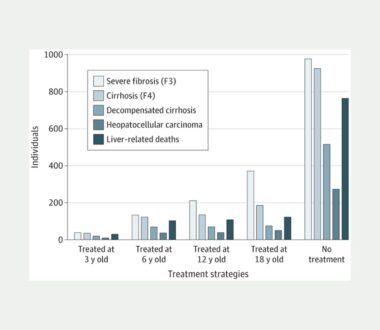
Informing Evidence-Based Medicine for Opioid Use Disorder Using Pharmacoeconomic Studies
Since 2021, over 100,000 individuals have died each year from a drug overdose, with approximately 76 percent of those deaths involving opioids. As the US health care system contends with this growing health crisis, improved access to evidence-based medication treatment for opioid use disorder (OUD) is imperative. Pharmacoeconomics, a branch of health economics used to evaluate comparative clinical, person-centered, and economic outcomes […]

Cost-Effectiveness of Strategies for Treatment Timing for Perinatally Acquired Hepatitis C Virus
Children with perinatally acquired hepatitis C virus (HCV) are now eligible to receive direct-acting antivirals (DAAs), a highly effective treatment for HCV, as early as the age of 3. Despite existing studies demonstrating DAA’s high efficacy and tolerance among adults and children between the 3 and 12 years old, there has been low uptake due […]

7 Ways to Improve an Already Effective Treatment for Stimulant Use Disorder
The opioid epidemic has been one of the most pressing and challenging issues that the U.S. has faced in recent decades, with countless lives lost to this devastating crisis. Now, stimulant-related overdoses are among the next big drug-related concerns, with recent studies showing that the mortality rate linked to stimulant use in the U.S. has […]

Economic Evaluations of Establishing Opioid Overdose Prevention Centers in 12 North American Cities: A Systematic Review
In this systematic literature review published in Value in Health, CHERISH Research Affiliates Czarina Behrends and Ahmed Bayoumi, CHERISH staff members Jared Leff, Jazmine Li, and Erminia Fardone, CHERISH investigators Kathryn McCollister, Sean M. Murphy, and Bruce Schackman, and former NIDA summer intern, Weston Lowry, analyzed 16 studies that summarized and identified gaps of economic […]

New Study Reveals Preventable-Suicide Risk Profiles
Individuals with physical health concerns made up the largest and fastest growing of five subgroups of individuals who died by suicide n the United States over roughly twenty years, according to an analysis led by Weill Cornell Medicine in collaboration with Columbia University, UC Berkeley School of Public Health, the University of Hong Kong and […]

Surgeons Are Closer to Predicting Which Patients Need Post-Surgery Opioids—and Which Ones Don’t
Opioids are routinely prescribed to patients after a surgery—whether they use them or not. A new study, led by LDI Senior Fellow Anish Agarwal will help tailor prescribing so patients get the right amount of opioid medications; not too little and not too much. Unused opioids are a particular problem. Opioid misuse can start when extra tablets […]

Chart of the Day: Rise in Patients with Opioid Use Disorder Leaving Hospital Prematurely
LDI Senior and Associate Fellows Ashish Thakrar, Margaret (Maggie) Lowenstein, Ryan Greysen, and M. Kit Delgado found that more people with opioid use disorder are leaving the hospital prematurely (or before medically advised), compared to marginal increases for individuals admitted for other reasons. In the study, “Trends in Before Medically Advised Discharges for Patients with Opioid Use Disorder, 2016-2020,” […]

Many State Medicaid Programs Still Require Prior Authorization for Buprenorphine Treatment for Opioid Use Disorder
The opioid epidemic has been an ongoing public health crisis in the United States, claiming countless lives and devastating communities. Buprenorphine, a highly effective medication for the treatment of opioid use disorders, holds the potential to save lives. However, a significant hurdle exists in the form of prior authorization requirements, which are associated with lower access to […]

Initiation of Hepatitis C Treatment Low Among Medicaid Recipients
While there are highly effective treatments for the hepatitis C virus (HCV), only 1 in 5 Medicaid enrollees diagnosed with HCV started treatment, according to a retrospective study led by researchers at Weill Cornell Medicine and Cornell University’s Ithaca campus. The findings revealed that treatment uptake rates were even lower among people under 30, women, […]

Economic benefits of substance use disorder treatment: A systematic literature review of economic evaluation studies from 2003 to 2021
The economic burden of substance use disorder (SUD) is significant. It encompasses clinical and societal costs such as health care and social services, criminal justice resources, loss of productivity, and premature mortality, and is estimated to cost more than $700 billion per year in the United States. To understand the gravity of these economic costs, […]

Budget Impact Tool for the Incorporation of Medications for Opioid Use Disorder into Jail/Prison Facilities
Despite evidence that medications for opioid use disorder (MOUD), namely methadone, buprenorphine, and naltrexone, provided at the point of incarceration improve the well-being of the individual and the public, financial and administrative limitations in jail/prison healthcare often serve as barriers to this recommended first-line treatment for OUD. In fact, evidence indicates that more than 80% […]

Addressing Statistical Issues Encountered in Conducting Prospective Economic Evaluations Alongside Clinical Trials
Conducting an economic evaluation alongside a randomized clinical trial provides valuable information for clinicians, insurers, and policy stakeholders. Integrating an economic evaluation within a trial provides researchers the opportunity to collect patient-level data at multiple time points on both cost and effectiveness outcomes, and to measure the comparative impact of treatments on these outcomes while […]
Engage with CHERISH
Submit a Consultation Request or Contact Us to learn more about how CHERISH can support your research or policy goals.